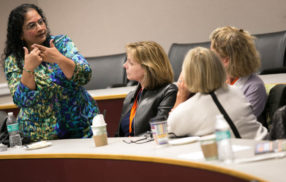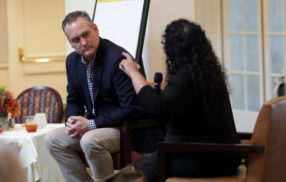
Entrepreneurship Journal Devotes New Issue to UVA Darden Professor’s Theory of Effectuation
By Dave Hendrick
An influential academic journal has devoted the entirety of a recent issue to effectuation, the theory of entrepreneurship pioneered by University of Virginia Darden School of Business Professor Saras Sarasvathy.
Co-edited by leading effectuation thinkers Gry Alsos, Tommy Hayward Clausen, Rene Mauer and Stuart Read, the special edition of Small Business Economics: An Entrepreneurship Journal includes 13 articles related to effectuation, with many pushing the theory into novel territories, including natural disaster response and the rise of art movements.
The journal’s publication is just the latest indication of the reach and influence of effectuation, which Sarasvathy discovered following rigorous examination of the way expert entrepreneurs think and act.
Since the initial article describing the five principles of effectuation nearly 20 years ago, Sarasvathy’s theory gained enormous traction across the globe among both academics and practitioners, spawning hundreds of research papers and influencing the orientation of startups — including for-profit, nonprofit and social organizations — as well as billion-dollar companies.
“Effectuation comes from the lived experiences of entrepreneurs, but the real insight today might be that the necessity to be entrepreneurial is not limited to entrepreneurs,” said Sarasvathy. “I can’t wait to see what the next set of effectuation scholars and educators will be working on.”
One hallmark of effectuation researchers is their interest in both scholarly topics and matters of more practical importance. For example, articles in the Small Business Economics issue include:
- “Effectuations, social bricolage and causation in the response to a natural disaster”
- “Does practice make micro-entrepreneurs perfect? An investigation of expertise acquisition using effectuation and causation”
- “Effectual control orientation and innovation performance: clarifying implications in the corporate context”
- “Comparing effectuation to discovery-driven planning, prescriptive entrepreneurship, business planning, lean startup, and design thinking”
- “The rise of art movements: an effectual process model of Picasso’s and Braque’s give-and-take during the creation of Cubism (1908–1914),” co-written by Darden alumnus Susan Harmeling (Ph.D. ’06)
In 2019, the Global Consortium of Entrepreneurship Centers presented Sarasvathy with the organization’s Legacy Impact Award for her contributions to entrepreneurship.
Read the effectuation collection on Darden Ideas to Action.
The University of Virginia Darden School of Business prepares responsible global leaders through unparalleled transformational learning experiences. Darden’s graduate degree programs (MBA, MSBA and Ph.D.) and Executive Education & Lifelong Learning programs offered by the Darden School Foundation set the stage for a lifetime of career advancement and impact. Darden’s top-ranked faculty, renowned for teaching excellence, inspires and shapes modern business leadership worldwide through research, thought leadership and business publishing. Darden has Grounds in Charlottesville, Virginia, and the Washington, D.C., area and a global community that includes 18,000 alumni in 90 countries. Darden was established in 1955 at the University of Virginia, a top public university founded by Thomas Jefferson in 1819 in Charlottesville, Virginia.
Press Contact
Molly Mitchell
Senior Associate Director, Editorial and Media Relations
Darden School of Business
University of Virginia
MitchellM@darden.virginia.edu







